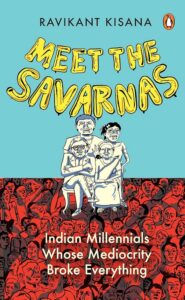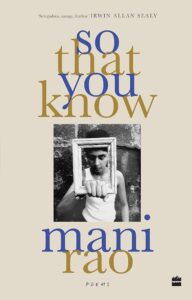Her
I first met her at the hospital–she had gone there to get medicines, and so had I. On seeing her, all the women started to avoid her. The doctor too expressed his disgust by closing his eyes. I was also repulsed–but by some means I looked towards her and smiled. She smiled too; or at least some effort was made. All semblance of a nose had disappeared, and instead of her nostrils there existed two big red holes. She didn’t have an eye, and the other too could not see at all without the neck’s support.
After a while I encountered her again at the chemist window. She asked me, in a singsong voice, “Where are you from?” I told her my address. She left with her medicine, and the compounder started telling me about her, without my having asked, “She is a vile woman, she is a slut-a slut! She is rotting and dying. Now she has come to get treated, the doctor is crazy to write her a prescription. Just throw her out, that bitch.”
I was a teacher at a girls’ school. I had just left college, the world touched my feet, the future spread out before me like a flower bed, each flower of which was no less than a rose or a chambeli1. I thought of the world as if it were a moonlit night, and the tide of the sea in it were somewhere graceful and somewhere cascading. I was happy, I didn’t know what pain or sadness was. Teaching too was an excuse to spend time. In those days, my personhood was yet to arrive.
The veil lifted as she was entering the college office. I stood up surprised, and without any thought, spoke out of habit– “Come, sit.” She hesitated but then sat down. There was a motiya2
flower in her hand. She kept it on the table in front of me. I did feel disgusted while picking it up, but I controlled myself and placed the flower in my hair. She smiled, got up, and left.
Now this became a routine. Every day during break hours she would lift the veil and come inside. I would invite her to sit down. She would sit, and keep some or the other flower in front of me. Teachers my age would tease me about her. No one would sit on the chair she used to sit on. Her face was only so disgusting–I wouldn’t touch the chair myself. Old Naseeban too would grumble when she left. This new madam is something else. She is the one who has taken to this dirty woman, why must we dust her chair.
The principal too would raise her brows and say, “Why do you call her to the school? The girls’ parents will surely object that this indecent woman comes here.” But another day would rise, she would come again, and I would say, “Come, sit.” Now, she would sit for a longer while. She would just keep looking at me, we never talked. Does she believe that I do not know of her reality? She would just keep looking, from that one squinted eye, with that disgusting face with no nose. Sometimes I would suspect that her eyes are filled with tears. What does she keep thinking? My heart wants me to ask, but where would I begin?
Often it so happened that whenever she came, other teachers would get up and leave and would keep scolding me in English, “She has come–Safiya’s that. Come, let’s go sit in the library. Look at the fucker’s face.”
Someone would say, “Safiya, I can’t even swallow my bread if I look at this wretched’s face, it makes me nauseous”.
“But the abomination chose so well, the number one amongst you.”
“We must veil ourselves in front of this bastard,” The fat old teacher who taught Deeniyat would simmer and say.
I would keep doing my work and she would keep looking. I would feel restless. What does she see? What does she think? Was she too, like me at some time? I would get goosebumps.
Why does she come? Does she not know people hate her and are repulsed? Mucus would keep dripping from those red holes everyday. Everyday I would think I should tell her no. Principal ma’am is right, the girls too babble. The teachers walk around expressing their disgust. But the next day when she would come, I would present my chair and say, again, “Come, sit.”
Does she not have a mirror. Does she not know that she is bearing the penance for her sins. Why doesn’t anyone tell her. Does she have anyone at all. Where does she live, where does she come from. Does she think I only consider her a disease. I am turned into a strange joke at the school. Not just a joke, an insult of sorts. But everytime she put a flower in front of me, I would place it in my hair and she would smile that horrible smile of hers.
Why does she look at me? Who is she? Who was she? Where was she born and how did she reach this state? What does she feel when she comes to me, a pain or a relief?
One day, as she was leaving, she blew her nose and the dirt smeared on the wall. Naseeban was rubbing the girls’ writing slates with mud and had been sitting with her sting since a long time. Naseeban got up straight with the vigour of a young person, and hit her on the back with the writing slate. She was alarmed. Old Naseeban forgot all manners that she had learnt in this
school in 20 years of her service. She who would tell girls to become well-mannered, forgot everything, herself becoming that Naseeban of the streets. “Bastard, slut, you think you can sit on chairs? You have grown wings–you who used to sit on the chowk. Today when the flesh is rotting and falling down, she wants to be a begum!”
A kick, another, a third fist…
I ran outside and held Naseeban,” My god, what are you doing?” A mob of girls assembled. The teachers too were running to here. Naseeban was not in control of herself.
“It’s you who has let her climb to our heads–a sewer brick elevated to the chaubaara4. She spoiled the whole wall. I have been a servant for twenty years, I have never seen sluts come to the school. I absolutely will not stay here. Go call another woman who….” Uncontrolled, Naseeban started towards her once again. People controlled the old woman.
I bent and picked her up. She was crying her eyes out. I held her and took her towards the crossing. Blood was flowing from her temple. She probably didn’t even know about it.
Crying, hiding her face, she mumbled, “Now you must have gotten to know.” and went away.
1 Jasmine
2 Jasmine
3 A subject of Islamic education.
4 The topmost room of a house.
Author’s Bio:
An Urdu writer, Rashid Jahan was known for her radical thoughts and writings on women’s writings. She also contributed to Anagarey.
Translator’s Bio:
Vinky Mittal is a writing tutor at the Centre for Writing and Communication at Ashoka University, India. She recently completed her MPhil at the Department of Comparative Literature and Translation Studies at Ambedkar University, Delhi.

Subscribe to our newsletter To Recieve Updates




Join our newsletter to receive updates